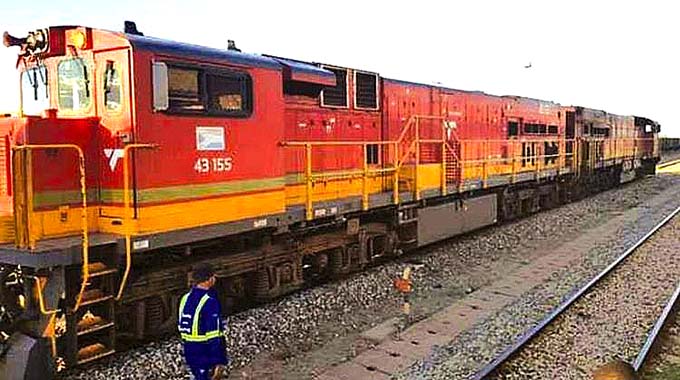Rail renaissance: Improving connectivity for economic growth
The 2025 National Budget offers a lifeline to the National Railways of Zimbabwe (NRZ), an institution pivotal for unlocking Zimbabwe’s industrial and economic potential.
With a targeted allocation of $180 million, the budget lays the groundwork for revitalising rail infrastructure, upgrading essential systems, and ensuring that NRZ evolves into a reliable, efficient and competitive transportation network. This investment transcends mere railways; it is an investment in Zimbabwe’s future.
The Government’s focus on NRZ in this budget comes at a critical juncture when Zimbabwe’s logistics and transport sector requires transformative solutions to reduce costs, enhance efficiency and boost economic competitiveness. Years of sanctions and underinvestment have left NRZ in dire need of repairs and modernisation.
Minister of Finance, Economic Development, and Investment Promotion, Professor Mthuli Ncube, emphasised that this intervention was about not just restoring NRZ, but reimagining it as a cornerstone of economic development.
In his 2025 budget statement, Minister Ncube highlighted that the allocated funds will target key areas to reinvigorate NRZ. A significant portion of the funding will focus on rehabilitating and upgrading rail infrastructure, ensuring that rail tracks, signalling systems and depots meet global standards.
This will drastically reduce derailments and delays, which have historically undermined NRZ’s reliability and profitability. Additionally, the recapitalisation plan includes procuring new rolling stock, such as locomotives and wagons, while maintaining the existing fleet to ensure consistent and dependable service delivery.
The Minister underscored that reviving NRZ was a capital-intensive project, necessitating Public-Private Partnerships (PPPs) and loans from development banks to supplement Government funding.
This strategy invites private investors to modernise Zimbabwe’s railways, introducing global expertise, financing, and technology to an industry that has long struggled with underperformance.
This intervention is at an opportune time for Zimbabwe’s mining, agriculture, and manufacturing industries, which heavily depend on bulk transportation.
Rail remains the most cost-effective and energy-efficient method for moving large volumes of goods over long distances.
Farmers exporting crops like tobacco and maize will benefit from significantly lower logistics costs, enhancing their profitability and competitiveness in regional and international markets.
Similarly, mining companies transporting commodities such as coal, platinum, and gold will gain from an efficient rail system that reduces transportation costs and increases export volumes.
For Zimbabwe’s economy, this investment in NRZ has far-reaching implications.
Improved rail efficiency will reduce reliance on road transport, which has severely damaged the country’s highways.
Heavy trucks have contributed to rapid road degradation, forcing the Government to allocate substantial funds for road rehabilitation annually.
By shifting bulk cargo back to rail, Government will not only save on road maintenance costs, but also ensure safer highways with fewer accidents caused by overloaded vehicles.
Regionally, a revitalised NRZ will position Zimbabwe as a vital logistics hub in Southern Africa.
Enhanced rail connectivity with neighbouring countries such as South Africa, Zambia and Mozambique will facilitate cross-border trade, allowing for seamless movement of goods. Zimbabwe’s strategic location in the North-South Corridor—a key regional trade route—means an efficient rail system will attract transit cargo, boosting revenue and strengthening regional economic integration.
Beyond economic benefits, the NRZ recapitalisation programme is a boon for ordinary Zimbabweans.
The rehabilitation of rail infrastructure and procurement of new rolling stock will create thousands of jobs, both directly and indirectly.
Construction workers, engineers and logistics experts will find employment opportunities as NRZ embarks on its modernisation journey.
The ripple effect will be felt in downstream industries, where businesses providing services and materials to NRZ will experience increased demand.
Moreover, the long-term benefits of this investment extend to the environment.
Rail transport is one of the eco-friendliest modes of transportation, producing significantly lower carbon emissions compared to road freight.
As Zimbabwe aligns its policies with global climate commitments, revitalising NRZ will contribute to reducing the environmental impact of the country’s logistics sector.
Minister Ncube’s vision for NRZ extends beyond short-term fixes.
His strategy aims to transform NRZ into a modern, self-sustaining entity that drives economic diversification and competitiveness. This forward-thinking approach reflects the Government’s understanding of NRZ as a national asset capable of stimulating growth across multiple sectors of the economy.
This budget allocation also complements Government’s broader infrastructure development agenda.
The ongoing rehabilitation of roads, energy sector reforms, and market modernisation demonstrate a holistic strategy to create an enabling environment for businesses to thrive. Reliable rail transport, coupled with improved road networks and energy supply, will attract investments, increase production, and position Zimbabwe as a competitive destination for trade and industry.
Ultimately, the resuscitation of NRZ is about building a better future for Zimbabwe.
For decades, the railway system has symbolised progress and industrialisation, and its revival holds the promise of economic resurgence.
With a clear vision, strategic partnerships, and targeted investments, the 2025 National Budget sets the stage for a connected, efficient, and resilient transportation network that serves the people and industries of Zimbabwe.
The benefits of this programme are extensive.
Farmers will access markets more cheaply, mining companies will export commodities efficiently, businesses will enjoy lower transportation costs, and thousands of Zimbabweans will find employment.
As NRZ rises again, so too will Zimbabwe’s economic fortunes, driven by a transportation system that connects communities, industries and nations.
The 2025 budget has initiated a rail renaissance, signalling growth, stability, and opportunity.
The NRZ is more than just a railway—it is the engine that will drive Zimbabwe towards a brighter and more prosperous future.-herald











